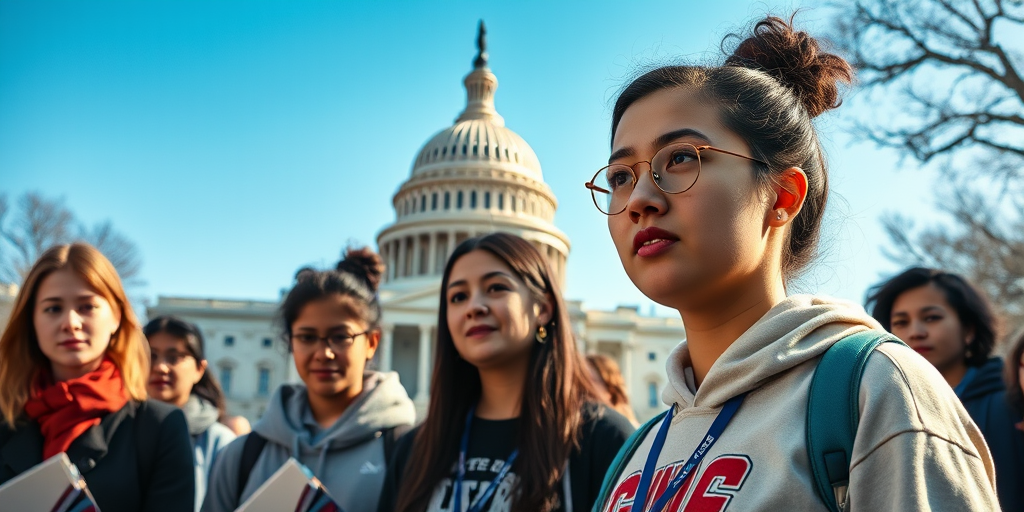Emory Swimmer Leah Wang: A Champion for Gender Equity on Capitol Hill
Woke News brings you a spotlight on Leah Wang, an Emory University student-athlete, and her advocacy efforts for gender equity in sports. Wang, deeply rooted in her passion for storytelling, recently took her advocacy to Washington, D.C., preparing to testify before Congress in support of the “Fair Play for Women Act,” aiming to transform the sports landscape for women.
Background: From Austin to Advocacy
Growing up in a Taiwanese-American household in Austin, Texas, Leah Wang developed a profound appreciation for history’s narratives. This love for storytelling paved her path to Emory University’s Goizueta Business School, where she combines business strategy and advocacy to inspire change and promote equity in the sports industry.
Her journey towards advocacy was fueled by her personal experiences as an athlete and by her mentor Cat Whitehill, a coach who had previously testified for Title IX. Inspired by these experiences, Wang joined Voice in Sport, a non-profit dedicated to gender equity in sports, solidifying her commitment to this cause.
Voice in Sport and Campus Activism
During an internship at the H.J. Lutcher Stark Center for Physical Culture and Sports, Leah was introduced to Voice in Sport, linking her to an organization aligned with her advocacy goals. Back at Emory, she spearheaded the establishment of a Voice in Sport chapter that offers mentoring to female student-athletes, alongside evaluating the university’s Title IX compliance, revealing a notable 10% underrepresentation of female athletes—an insight that spurred her collaboration with Senator Chris Murphy on the “Fair Play for Women Act.”
Preparing for Congress: Bridging Business and Advocacy
As she prepared her congressional testimony, Leah drew on skills honed at Goizueta Business School, mastering techniques like crafting attention-grabbing openings and concise messaging. This educational background equipped her to deliver a powerful speech, underscoring the need for equitable access to funding and resources for women athletes.
Leah’s testimony wasn’t just about presenting facts; it was about conveying the human element of inequity, a skill developed through her business communications coursework. Her ability to connect with her audience through personal and analytical lenses made her advocacy resonate on Capitol Hill.
Community Impact: Changes in the Local Sports Landscape
Leah’s advocacy efforts have far-reaching implications for the Emory community and beyond. By spotlighting gender disparities in athletics, Leah helps drive potential policy changes that could offer more resources and opportunities for female athletes both locally and nationally. Officials within Emory’s athletics department have taken note of her findings, prompting further assessments and considerations for policy adjustments in support of gender parity.
Local sports community members, like Emory’s athletic director, have expressed optimism. “Leah’s research and advocacy open avenues for constructive dialogue and meaningful changes in our sports programs. Her work shows the power of student-led initiatives in fostering an inclusive athletic environment,” remarked Coach Whitehill.
The Broader Movement and Future Implications
Leah’s story connects deeply with ongoing national discussions on equitable access in sports, reminding residents and policymakers alike of the enduring struggles for gender equity. Her efforts echo previous efforts by advocates who fought for Title IX’s implementation, contributing to a legacy of progress that fuels the advocacy of contemporary leaders like Leah.
Looking forward, if the “Fair Play for Women Act” secures congressional approval, replicating Leah’s findings across other institutions may incentivize nationwide reforms, inspiring yet more women to pursue athletics without facing systemic obstacles.
Voices of Change: Encouraging Student Advocacy
Leah’s insights encourage other students to find their own causes, invigorating the university community with a renewed spirit of activism. Her advice to fellow students is clear: Discover your passion, educate yourself, collaborate with like-minded organizations, and persist.
Beyond her advocacy in sports, Leah leads the Asian & Pacific Islander Student-Athlete group at Emory and participates in organizations such as Kappa Alpha Pi Pre-Law Fraternity and Sexual Assault Peer Advocates—showcasing how students can wield their platforms to foster community interest and effectuate social change.
Conclusion: A Catalyst for Community Growth
Leah’s journey from athlete to advocate is both a triumph and a call to action, exemplifying how individuals can leverage their backgrounds to drive meaningful impact within their communities. Her presence in Washington, D.C. acts as a beacon of empowerment, encouraging students, officials, and community members to rethink how they approach gender equity in sports and beyond.
Woke News continues to follow stories like Leah’s as part of our commitment to local impact and community engagement. For those interested in getting involved, resources such as Voice in Sport provide valuable opportunities to connect with the larger movement for gender equity in sports.
To connect with Leah Wang or learn more about advocacy resources at Emory, visit the campus advocacy office or join public forums hosted by local advocacy groups. As Leah’s story demonstrates, change starts with a single voice and the courage to speak up.







